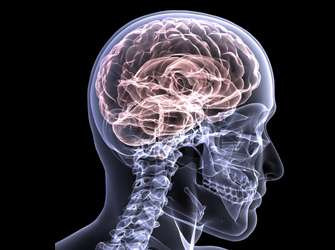Hunting down the trigger for Parkinson's: Failing dopamine pump damages brain cells

A study group at the Medical University of Vienna's Centre for Brain Research has investigated the function of an intracellular dopamine pump in Parkinson's patients compared to a healthy test group. It turned out that this pump is less effective at pumping out dopamine and storing it in the brain cells of Parkinson's sufferers. If dopamine is not stored correctly, however, it can cause self-destruction of the affected nerve cells.
In the brain, dopamine mediates the exchange of information between different neurons and, to help it do this, it is continuously reformed at the contact points between the corresponding nerve cells. It is stored in structures known as vesicles (intracellular bubbles) and it is released when required. In people with Parkinson's disease, the death of these nerve cells causes a lack of dopamine, and this in turn causes the familiar movement problems such as motor retardation, stiffness of the muscles and tremors.
More than 50 years ago, in the Institute of Pharmacology at the University of Vienna (now the MedUni Vienna), Herbert Ehringer and Oleh Hornykiewicz discovered that Parkinson's disease is caused by a lack of dopamine in certain regions of the brain. This discovery enabled Hornykiewicz to introduce the amino acid L-DOPA into the treatment of Parkinson's to substitute the dopamine and make the symptoms of the condition manageable for years.
The reasons for the death of nerve cells in Parkinson's disease are not yet fully understood, however, which is why it is still not possible to prevent the disease from developing. Nevertheless, dopamine itself, if it is not stored correctly in vesicles, can cause self-destruction of the affected nerve cells.
Now, a further step forward has been taken in the research into the causes of this disease: a study at the MedUni Vienna's Centre for Brain Research, led by Christian Pifl and the now 87-year-old Oleh Hornykiewicz, compared the brains of deceased Parkinson's patients with those of a neurologically healthy control group. For the first time, it was possible to prepare the dopamine-storing vesicles from the brains so that their ability to store dopamine by pumping it in could be measured in quantitative terms.
It turned out that the pumps in the vesicles of Parkinson's sufferers pumped the dopamine out less efficiently. "This pump deficiency and the associated reduction in dopamine storage capacity of the Parkinson's vesicles could lead to dopamine collecting in the nerve cells, developing its toxic effect and destroying the nerve cells," explains Christian Pifl.
More information: Christian Pifl, Alex Rajput, Harald Reither, Javier Blesa, Carmen Cavada, José A. Obeso, Ali H. Rajput, Oleh Hornykiewicz – "Is Parkinson's disease a vesicular dopamine storage disorder? Evidence from a study in isolated synaptic vesicles of human and non-human primate striatum." Journal of Neuroscience

















